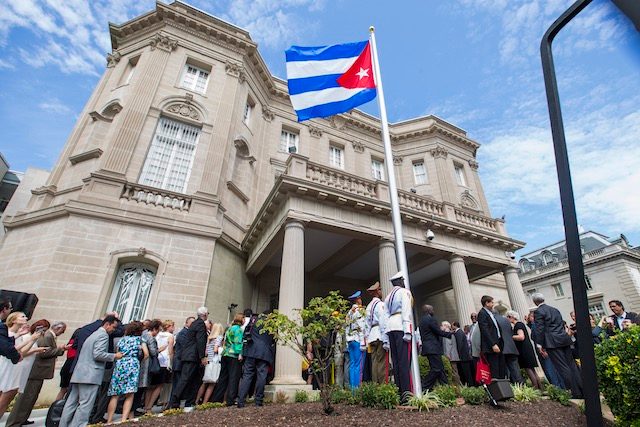SUMMARY
This is AI generated summarization, which may have errors. For context, always refer to the full article.

WASHINGTON DC, USA (3rd UPDATE) – The Cuban flag flew proudly over Havana’s newly restored embassy Monday, July 20, as the US and Cuba relaunched diplomatic ties but swiftly cautioned that sharp differences lingered after five decades of enmity.
Some 7 months after US President Barack Obama and his Cuban counterpart Raul Castro agreed to restore ties snapped in 1961 during the Cold War, Havana and Washington restored diplomatic relations and reopened full embassies in the two capitals.
But diplomats from the old adversaries said there were many difficulties to overcome towards fully normalizing ties.
“This milestone does not signify an end to the many differences that still separate our governments,” said US Secretary of State John Kerry, who announced he will visit Havana on August 14. He will be the first US top diplomat to visit the Cuban capital since 1945.
“But it does reflect the reality that the Cold War ended long ago, that the interests of both countries are better served by engagement than by estrangement,” Kerry insisted at a packed press conference.
He was speaking after welcoming Cuban Foreign Minister Bruno Rodriguez, who became the first top Cuban diplomat to set foot inside the State Department since 1958.
The differences were immediately laid bare when Rodriguez swiftly demanded an end to the US economic embargo on the communist-run Caribbean island and the return of territory used as a US military base in southern Guantanamo Bay.
“Totally lifting the blockade, the return of the illegally occupied territory of Guantanamo, as well as the full respect for Cuban sovereignty and the compensation to our people for human and economic damages, are crucial to be able to move towards the normalization of relations,” Rodriguez said.
Kerry said Obama’s administration wants to lift the economic embargo imposed in 1962, and that he hoped it would be lifted “at the appropriate time.”
But he stressed that “at this time, there is no intention to alter the existing lease treaty” on Guantanamo Bay, also home to a notorious US military prison which Obama has vowed to close.
‘Viva Fidel’

In the morning, Rodriguez attended a ceremony at the Cuban embassy where a crowd of more than 500 people cheered and shouted “Fidel, Fidel” and “Viva Raul” as the distinctive flag with a white star on a red triangle and blue and white stripes was raised by an honor guard.
They were referring to Cuba’s revolutionary leader Fidel Castro and his brother Raul, who took over from an ailing Fidel as president.
The Cuban banner also took its place in the columned marble entrance hall to the State Department, hoisted before dawn between the flags of Croatia and Cyprus.
At the US embassy in Havana, however, where some 360 people including 30 Americans work, there were few outward signs Monday of its new status, with diplomats awaiting Kerry’s arrival next month for the flag-raising.
The restoration of diplomatic ties has been hailed by Cubans, who hope to see an easing of tough economic conditions.
“It’s a day to be celebrated, it’s an important day that will bring new opportunities,” said 18-year-old Cuban Adriel Gonzales, who had the honor of raising the Cuban flag outside the US embassy in Havana.
But another of the other biggest areas of contention remains human rights, with Washington pressing for an improvement in freedoms of expression, religion and the press.
“It is true there are profound differences… with regard to our views about the exercise of human rights by all citizens and in the whole planet… which will inevitably persist,” said Rodriguez.
When asked if there would now be a greater political opening in Cuba, he retorted that that had already happened in 1959, the year that Fidel Castro led the communist revolution.
“The flag that we raised today in the Cuban embassy, waited for 54 years to be back on the flagpole put up in this capital. We Cubans feel very happy with the way in which we manage our internal affairs.”
Tough negotiations eased one stumbling block, with the Cuban security presence outside the US embassy in Havana already reduced. And while American diplomats still have to provide notification of their travel, they will no longer have to seek permission.
US charge d’affaires Jeffrey DeLaurentis will stay in post in Havana until a new ambassador is confirmed, with his Cuban counterpart Jose Cabanas also remaining in place in Washington. – Jo Biddle and Aldo Gamboa, AFP / Rappler.com
Add a comment
How does this make you feel?
There are no comments yet. Add your comment to start the conversation.